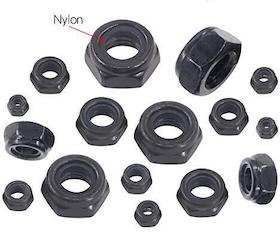
Curated with aloha by
Ted Mooney, P.E. RET

The authoritative public forum
for Metal Finishing 1989-2025

-----
Can Nylon Insert Lock Nuts be baked after plating?
Q. So how does McMaster have black oxide nylon nuts? www.mcmaster.com/94407A104/
Matt Anthony- California
June 6, 2024
A. Hi Matt. I'm not sure exactly what you are asking or what you've read here that you are requesting clarification about. Your question sounds rhetorical. Black oxide finishes rarely require baking anyway but ...
Although it would be possible to insert the nylon before doing the black oxiding or other metal finishing, there doesn't seem to be a good reason to do so, and there does seem to be good reason to do the finishing first, so I presume that is what is done in case of McMaster black oxide nylon nuts.
The other postings here seem to relate to re-plating nuts which already have inserts installed and which are for some reason "irreplaceable"
Luck & Regards,

Ted Mooney, P.E. RET
Striving to live Aloha
finishing.com - Pine Beach, New Jersey
⇩ Related postings, oldest first ⇩
Q. I need to replate some old and irreplaceable nylon insert lock nuts. In talking to the local platers, they are not sure what to do as far as baking goes. I usually have my fasteners, springs, etc. baked after plating but I think this would not be good for the nylon! Anyone have actual experience with this or know how it's done on new ones? Thanks a lot.
Rhett Everett- Moorpark, California USA
2003
A. What are you plating the nylon with? Perhaps we will then know why the plater wants to bake them. Although you do not say at what temperature, I would advise that baking nylon at anything over about 110 °C (maybe even less!) is not a good idea, depending on the type of nylon.

Trevor Crichton
R&D practical scientist
Chesham, Bucks, UK
A. You have nuts to plate? "Nuts" is what general McFuff of the 101 St. Airborne said to the Germany generals when they asked him to surrender, they also had him surrounded and outnumbered at Baston. He held and reinforcements arrived.
If the nuts in question need to be stripped prior to replating, then often an acid is used, often HCl. Acids in general are bad on Nylon and HCl most dismal. Most plating preps will be bad for nylon also. We find that, like WD-40, Nylon is a taboo on the shop floor. Those nice little Nylon wire ties can lead to a rather pain in the ass when dispersed in passivate solutions! Lesson hard learned.
- Minneapolis, Minnesota
A. In the previous experience that I have had in plating nylon insert nuts, baking was a non-issue. The nuts did not require a post bake due to the hardness <32 RC. However, the rework process is very difficult. The nylon is damaged by the acid in the electroplate process. You did not state why the nuts need replating. It is possible that they could be "flashed" quickly without damaging the nylon.

David J. Wolf
Medina, Ohio
Dip-spin zinc-rich coatings on nylon insert nuts
Q. Can Magni 501 be applied and cured on a nylon insert locknut without melting the nylon during the bake process? If a lower bake temp is used multiple times, can the process still achieve the specified salt spray rating?
Kevin Yandek- Oak Forest, Illinois
June 16, 2017
A. Hi Kevin. Most such nylon locking nuts are zinc electroplated rather than dip-spin coated. But plating chemicals are not good for nylon either, and I'm not sure if the nylon is inserted and the castellations crimped after plating rather than before. I'm sure many plating shops have plated them and can clear that up for us.
As for Magni 501, I don't know the curing temperature of that particular product, but I have read that you should select a dip-spin coating with a low curing temperature for nylon locking nuts. I would be surprised if multiple bakes at a lower temperature is an accepted procedure.
Regards,

Ted Mooney, P.E. RET
Striving to live Aloha
finishing.com - Pine Beach, New Jersey
Q, A, or Comment on THIS thread -or- Start a NEW Thread
